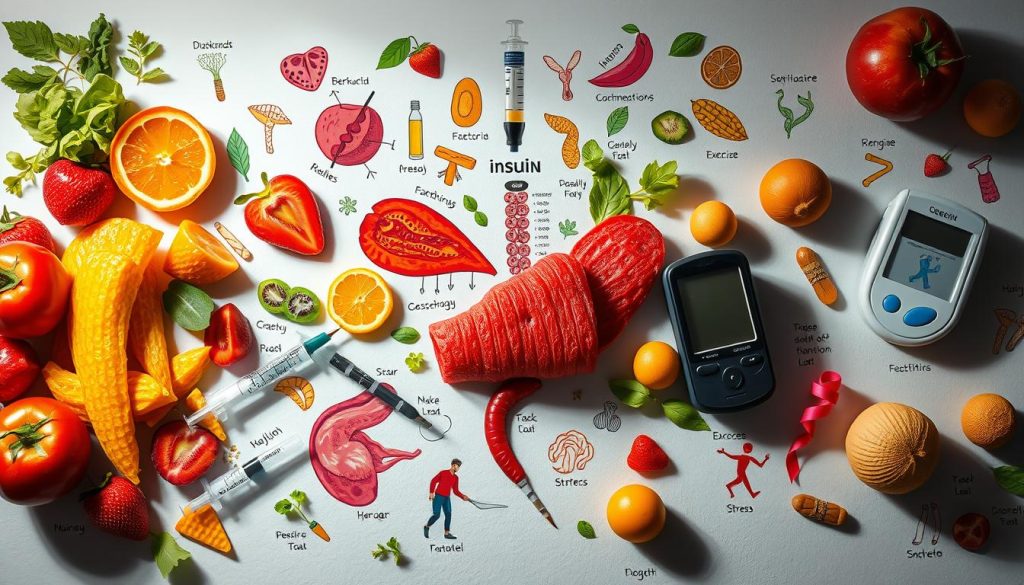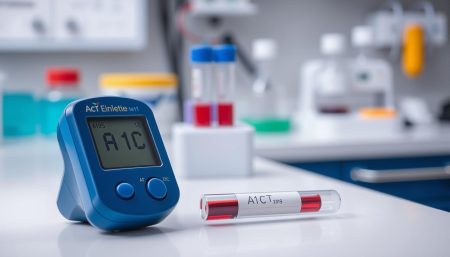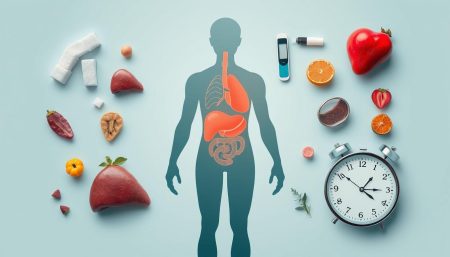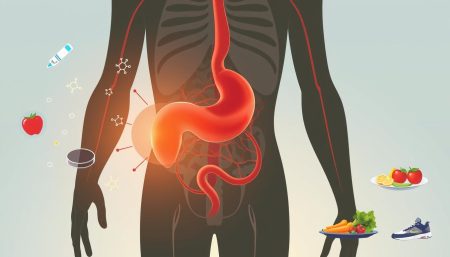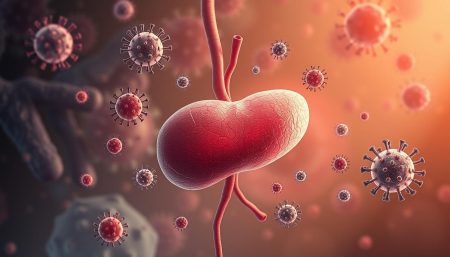Diabetes Mellitus is a major chronic disease worldwide, affecting millions. It brings many health problems. Knowing the causes of diabetes mellitus is key to managing and preventing it.
The underlying causes of diabetes mellitus are varied. They include genetic factors, lifestyle choices, and environmental influences. This mix makes it important to understand what causes diabetes mellitus. By doing so, we can work to reduce its impact.
The Nature of Diabetes Mellitus
The origins of diabetes mellitus come from a mix of genetics and lifestyle. This makes studying the etiology of diabetes mellitus very complex. The main cause is when the body can’t make or use insulin well. Knowing this helps us understand why diabetes happens and how it affects people differently.
There are many types of diabetes, each with its own reasons. Type 1 diabetes happens when the immune system attacks insulin-making cells. Type 2 diabetes, which is more common, is often linked to being overweight and not being active enough.
- Type 1 Diabetes Mellitus: Autoimmune destruction of beta cells
- Type 2 Diabetes Mellitus: Primarily due to obesity and physical inactivity
- Gestational Diabetes: Hormonal changes during pregnancy impede insulin action
The origins of diabetes mellitus may differ, but they all lead to high blood sugar. Symptoms include needing to pee a lot, feeling very thirsty, and losing weight without trying. The etiology of diabetes mellitus also involves genetics and the environment, which can increase risk in some groups.
Looking into how sugar is broken down and insulin works helps us understand diabetes. These processes show how important it is to keep blood sugar levels in check. This is key for the body to function properly, making diabetes a serious and widespread issue.
Diabetes Mellitus Causes
This section looks into what causes diabetes mellitus. It explores how genetics and lifestyle interact. Knowing these causes helps us manage and prevent the disease better.
Genetic Predisposition and Family History
Genetics play a big role in diabetes mellitus. People with a family history of diabetes are more likely to get it. This shows how genetics can set the stage for both Type 1 and Type 2 diabetes.
Lifestyle and Environmental Factors
Lifestyle choices greatly affect diabetes risk. Eating too much and not exercising enough can lead to obesity, a big risk factor for Type 2 diabetes. Environmental factors like toxins and viruses also play a part. This shows how lifestyle and environment work together to cause diabetes.
Types of Diabetes Mellitus and Their Specific Causes
Diabetes mellitus is a group of metabolic diseases with high blood glucose levels. Each type of diabetes—Type 1, Type 2, and gestational diabetes—has its own causes and how it works.
Type 1 diabetes causes are mainly due to an autoimmune attack. The body’s immune system attacks and destroys the insulin-making beta cells in the pancreas. This is often because of genetics and possibly viruses.
Type 2 diabetes causes are linked to lifestyle and genetics. It involves insulin resistance, where cells don’t use insulin well. Over time, the pancreas can’t make enough insulin, mainly due to obesity and not being active enough.
Gestational diabetes causes happen because of hormonal changes during pregnancy. This leads to insulin resistance. It usually goes away after pregnancy but can raise the risk of type 2 diabetes later.
| Type of Diabetes | Main Causes | Risk Factors |
|---|---|---|
| Type 1 Diabetes | Autoimmune destruction of beta cells | Genetic predisposition, environmental triggers |
| Type 2 Diabetes | Insulin resistance | Obesity, sedentary lifestyle, genetics |
| Gestational Diabetes | Hormonal changes during pregnancy | Pregnancy, family history of diabetes |
Knowing the details of diabetes mellitus causes is important for prevention, management, and treatment. Being aware and educated helps in spotting and reducing risks for each type of diabetes.
Lifestyle Choices Leading to Type 2 Diabetes
Understanding how lifestyle affects diabetes risk is key. It shows us why Type 2 diabetes happens. Our daily choices, like what we eat and how much we move, greatly impact our health. We’ll look at how diet, lack of exercise, and obesity lead to diabetes.
Dietary Habits and Nutritional Aspects
Diet is a big factor in Type 2 diabetes risk. Eating too much processed food and sugar makes our bodies need more insulin. This can lead to insulin resistance, a major diabetes cause. Eating foods high in fiber, whole grains, and nutrients can help lower this risk.
Physical Inactivity and Sedentary Life
Not being active is another big risk factor. Exercise helps keep weight healthy, improves insulin use, and boosts heart health. These are all important for avoiding diabetes. Being active is a strong way to prevent this chronic disease.
Obesity and Its Role in Diabetes Development
Obesity is very linked to Type 2 diabetes. Too much body fat, mainly around the belly, raises inflammation and insulin resistance. This increases diabetes risk. Losing weight through diet and exercise is key to reducing this risk.
Hormonal Influences and Their Role in Diabetes
Looking into the etiology of diabetes mellitus shows that hormonal imbalances are key. This part explains how certain hormones, aside from insulin, affect blood sugar. They play a big role in the underlying causes of diabetes mellitus.
Hormones like glucagon, cortisol, and growth hormone work together with insulin. They can change blood sugar levels. When this balance is off, it can lead to hormonal imbalances and diabetes. This can cause problems with managing blood sugar in the short and long term.
Understanding how hormones affect diabetes is important. It helps us see how diabetes can happen in people without a family history. Finding ways to fix these imbalances could lead to new ways to prevent and treat diabetes.
| Hormone | Function | Impact on Blood Sugar |
|---|---|---|
| Insulin | Reduces blood glucose | Essential for glucose uptake into cells |
| Glucagon | Increase blood glucose | Stimulates glucose production in liver |
| Cortisol | Stress hormone | Raises blood sugar and can lead to insulin resistance |
| Growth Hormone | Regulates metabolism | Increases blood sugar levels during growth spurts and stress |
It’s important to find ways to manage these hormonal effects to prevent diabetes. This shows the need for care that looks at more than just insulin. It’s about understanding how all hormones contribute to etiology of diabetes mellitus.
Insulin Resistance: Central Mechanism in Diabetes Etiology
Understanding insulin resistance is key to knowing what causes diabetes mellitus. It’s not just a result but a main cause of type 2 diabetes. When cells in muscles, fat, and the liver don’t respond well to insulin, they can’t take up glucose easily. This makes the pancreas work harder to produce more insulin.
At first, the pancreas can keep up with the demand for insulin. But over time, it can’t keep up, leading to high blood sugar levels. Genetics, lack of exercise, and a bad diet all play a part in causing insulin resistance. This increases the risk of getting diabetes.
Insulin resistance affects how cells take in glucose and how the body breaks down fats and proteins. This leads to metabolic problems. These problems are a big reason why insulin resistance turns into diabetes mellitus.
| Progression Stage | Description | Impact on Health |
|---|---|---|
| Early Insulin Resistance | Cells start to resist insulin, but insulin levels keep blood sugar normal. | Usually no symptoms, can be managed with lifestyle changes. |
| Advanced Insulin Resistance | The pancreas works hard to make more insulin, blood sugar levels go up and down. | Prediabetes risk goes up, health starts to decline without action. |
| Diabetes Onset | Insulin production from the pancreas is not enough, blood sugar stays high. | Diabetes symptoms become clear, medical help is needed. |
Knowing the signs and how insulin resistance and diabetes work together can help prevent or delay diabetes. Making healthy lifestyle choices like eating right and staying active can improve insulin sensitivity. This is important in fighting the growing problem of diabetes.
Genetics and Diabetes Mellitus: Understanding the Connection
Looking into the genetic predisposition to diabetes helps us see why some people are more likely to get it. Knowing the genetic factors behind it is key for early detection and treatment plans.
Hereditary Factors in Diabetes Risk
Family history is a big sign of hereditary diabetes risks. If a family member has diabetes, it increases the chance of you getting it too. This shows how important genetic counseling and prevention are for those at risk.
Genetic Mutations and Diabetes
Some genetic changes can directly cause diabetes mellitus causes. For example, changes in the HNF1A and HNF4A genes can lead to MODY, a type of diabetes passed down in families. These changes affect how the body uses insulin, impacting glucose levels for life.
| Type of Diabetes | Related Genetic Mutation | Implications |
|---|---|---|
| Type 1 Diabetes | HLA DR3-DQ2 and DR4-DQ8 | Increased Autoimmune Activity |
| Type 2 Diabetes | TCF7L2 | Insulin Secretion and Glucose Production |
| MODY | HNF1A, HNF4A | Impaired Insulin Regulation |
Knowing about specific genetic markers helps doctors create better treatment plans. Early genetic tests and lifestyle changes can help control diabetes risk.
It’s also important to understand how genetics and environment interact in diabetes care. For more on diabetes and its effects, check out how it relates to hair loss.
Autoimmune Destruction of the Beta Cells in Type 1 Diabetes
Exploring the causes of type 1 diabetes leads us to the autoimmune attacks on insulin-making beta cells. This damage comes from autoimmune causes of diabetes mellitus. It’s when the immune system mistakenly attacks and destroys these vital cells.
The start of this autoimmune attack is complex. It’s influenced by genes and possibly by the environment. Scientists are trying to understand why the immune system attacks the body’s own cells. But it’s clear that this attack makes the pancreas unable to make insulin over time.
- Genetic susceptibility plays a big role, with some genes making people more likely to get it.
- Things like viral infections might start this autoimmune attack.
| Factor | Impact on Autoimmune Response |
|---|---|
| Genetic Markers | Identifies individuals at higher risk |
| Environmental Triggers | Potential initiators of autoimmune reactions |
Learning about autoimmune causes of diabetes mellitus helps us understand type 1 diabetes. It also opens up ways to find it early and treat it better. This could change how we manage the disease.
Metabolic Syndrome and Its Contribution to Diabetes
Understanding the link between metabolic syndrome and diabetes risk is key. Metabolic syndrome is a group of health issues. These include high blood pressure, high blood sugar, and excess body fat around the waist. It also includes abnormal cholesterol or triglyceride levels.
These conditions together raise your risk of heart disease, stroke, and type 2 diabetes. Each part of metabolic syndrome plays a role in increasing diabetes risk. For example, insulin resistance, a common part of metabolic syndrome, can lead to diabetes.
- Increased blood pressure: It can damage arteries, making them stiff and narrow. This can make it harder to control blood sugar.
- High blood sugar levels: They can cause insulin resistance, a key part of type 2 diabetes.
- Excess body fat around the waist: This is often linked to higher visceral fat. Visceral fat is associated with insulin resistance.
- Abnormal cholesterol or triglyceride levels: These can increase oxidative stress and inflammation. Both are factors in diabetes development.
It’s important to understand metabolic syndrome to tackle diabetes mellitus causes and lower metabolic syndrome and diabetes risk. By managing metabolic syndrome, you can reduce the chance of getting diabetes. Changes in diet, more exercise, and medical treatments can help manage these conditions well.
- Dietary changes to eat fewer calories and more nutrients
- Regular exercise to boost metabolic health
- Medicine to control risk factors like high blood pressure and high blood sugar
Gestational Diabetes: Reasons and Risks for Mothers and Babies
Learning about the causes of gestational diabetes helps us understand how pregnancy hormones affect mothers and their babies. This part explains how hormonal shifts during pregnancy can lead to gestational diabetes. It also talks about the big risks of gestational diabetes if a woman has had it before.
Pregnancy-Induced Hormonal Changes
Pregnancy brings big changes in the body to help the baby grow. These changes can make it hard for the mother to handle blood sugar, leading to high glucose levels. A key hormone, placental lactogen, makes it harder for insulin to work.
History of Gestational Diabetes in Previous Pregnancies
If a woman had gestational diabetes before, she’s at higher risk for it again. This shows why it’s so important to watch and manage it closely to keep both mom and baby safe.
| Condition | Risk Factor | Impact |
|---|---|---|
| Gestational Diabetes in 1st Pregnancy | High | Increased likelihood in subsequent pregnancies |
| Gestational Diabetes with Family History | Very High | Greater predisposition shared among close relatives |
| Gestational Diabetes without Prior History | Moderate | Possible development due to lifestyle or hormonal factors |

The Influence of Age and Ethnicity on Diabetes Risk
It’s important to understand how age and ethnicity affect diabetes risk. This knowledge helps in creating better prevention plans. Age and ethnic background play big roles in who gets diabetes and how it’s managed.
Age-Related Risks for Developing Diabetes
As people get older, their risk of getting diabetes goes up. This is because their body’s metabolism changes, they become less sensitive to insulin, and their pancreas doesn’t work as well. It’s key to spot these changes early to help manage diabetes.
Ethnicity and Genetic Susceptibility to Diabetes
Diabetes affects different ethnic groups in different ways. Some groups are more likely to get diabetes than others. We need to look into the genetic and environmental factors that make some groups more at risk.
| Ethnic Group | Prevalence (%) | Age Group |
|---|---|---|
| Hispanic | 12.5 | 45-64 years |
| African American | 16.4 | 45-64 years |
| Non-Hispanic Whites | 7.4 | 45-64 years |
| Asian Americans | 9.2 | 45-64 years |
Environmental Toxins and Chemical Exposures as Diabetes Triggers
Research into environmental factors in diabetes shows how toxins triggering diabetes mellitus are a big health worry. This part talks about the different environmental chemicals that might raise diabetes risk. These chemicals can mess with how our bodies work.
Studies have found a strong link between certain toxins and higher blood sugar levels. This can lead to diabetes mellitus. Heavy metals like arsenic, lead, and mercury are among these toxins. Also, chemicals in pesticides and plastics, like phthalates and BPA, are harmful.
| Toxin | Sources | Potential Impact on Diabetes Risk |
|---|---|---|
| Arsenic | Contaminated water, certain pesticides | Increased insulin resistance |
| Lead | Old paint, industrial pollution | Impaired glucose metabolism |
| Mercury | Seafood, dental fillings | Alterations in insulin response |
| Bisphenol A (BPA) | Plastic containers, can liners | Changes in cellular signaling leading to diabetes |
| Phthalates | Plasticizers, cosmetics | Disruption of hormone function linked to obesity |
Toxins like these, known as endocrine disruptors, can mess with our hormone system. They can make insulin less effective. This is bad because insulin helps control blood sugar levels. So, environmental factors in diabetes like these toxins can cause diabetes or make it worse.
People living in polluted areas might get diabetes more often. This shows a strong link between pollution and health problems. We need to do more to stop pollution and teach people about environmental factors in diabetes. This can help fight the rise of diabetes caused by toxins triggering diabetes mellitus.
Medications That Can Induce Diabetes
When we give certain medicines, we must think about the risk of drug-induced diabetes. It’s key to know how these drugs affect blood sugar. This helps us take better care of our patients. Let’s look at some common medicines that can raise the risk of diabetes and why.
Some drugs can mess with how our body uses insulin or even hurt our pancreas. This can cause big changes in blood sugar levels. Over time, it might lead to drug-induced diabetes. Here’s a list of medicines that might increase the chance of getting diabetes.
| Medication | Common Use | Mechanism Affecting Diabetes Risk |
|---|---|---|
| Corticosteroids | Inflammation Reduction | Increases insulin resistance |
| Thiazides | Hypertension Management | Impairs pancreatic beta-cell function |
| β-blockers | Heart Disease Management | Obscures hypoglycemia symptoms, increases insulin resistance |
| Antipsychotics | Mental Health Disorders | Weight gain and increased insulin resistance |
| Statins | Cholesterol Lowering | May increase blood sugar levels |
Even though these medicines are vital for treating many conditions, we must watch blood sugar levels closely. Doctors need to manage these medicines carefully. Sometimes, we might need to change the dose or find other treatments to avoid drug-induced diabetes.
Rare Forms of Diabetes Stemming from Monogenic and Other Specific Causes
It’s important to know about monogenic diabetes and specific causes of rare diabetes. Monogenic diabetes comes from a single gene issue. It shows how genes play a big role in how our body handles sugar.
This rare diabetes is linked to certain syndromes. Each has its own traits and treatment plans. Knowing these details is key for families and doctors to help manage the condition.
- Neonatal diabetes mellitus (NDM) – appears in the first 6 months of life.
- Maturity-onset diabetes of the young (MODY) – diagnoses typically occur in adolescence or early adulthood.
- Other genetic syndromes occasionally associated with diabetes – such as Wolfram Syndrome, characterized by insulin-dependent diabetes along with neurological and anatomical abnormalities.
Managing monogenic diabetes is different from common diabetes types. It needs a precise genetic test. This leads to treatments that might not be used for Type 1 or Type 2 diabetes. Knowing these differences is vital for better care and results.
Psychological Stress and Its Impact on Diabetes Onset
Diabetes is becoming more common worldwide. It’s important to understand what causes it. Psychological stress is now seen as a key factor in getting diabetes, leading to more research on this topic.
Chronic Stress and Blood Sugar Regulation
Chronic stress makes it hard for the body to control blood sugar. Stress hormones like cortisol can raise blood sugar levels. This is a big reason why stress can lead to diabetes.
This hormonal change affects how the body uses glucose and insulin. It makes it easier for diabetes to develop.
Stress-Induced Behavioral Patterns Affecting Diabetes Risk
Stress can lead to unhealthy behaviors that increase diabetes risk. People under stress might eat poorly, not exercise, and have irregular sleep. These habits play a big role in diabetes risk.
Knowing these behaviors can help in finding ways to reduce stress’s impact on diabetes.

The Interplay of Hypertension and Diabetes
The relationship between hypertension and diabetes is complex. High blood pressure often comes with diabetes, making each worse. This connection is key because it raises the cardiovascular risk and diabetes patients face.
Shared risk factors include bad diets, not enough exercise, and genetics. These factors help both diseases grow. It’s important to understand how they affect each other.
Hypertension can damage blood vessels, making it hard for insulin to work. Diabetes can also make blood vessels stiff, raising blood pressure. Managing one condition can help the other, showing the need for a full healthcare plan.
Looking into prevention and management, a great resource is managing cardiovascular diseases and their risks. Keeping a healthy heart and regular check-ups are key. This shows how important it is to educate patients and take charge of their health.
FAQ
Q: What are the main causes of diabetes mellitus?
A: Diabetes mellitus comes from genetics, lifestyle, and environment. Family history, bad diet, and lack of exercise play a part. Obesity and toxins also contribute.
Q: How does genetic predisposition contribute to diabetes mellitus?
A: Family history can raise your risk. Inherited genes affect blood sugar regulation. Rare genetic mutations can cause monogenic diabetes.
Q: Can lifestyle choices trigger diabetes mellitus?
A: Yes, unhealthy diet and lack of exercise can lead to Type 2 diabetes. They cause insulin resistance and poor glucose use.
Q: What hormonal imbalances can lead to diabetes mellitus?
A: Hormonal issues like insulin, glucagon, and cortisol imbalances can cause diabetes. These disrupt blood sugar control.
Q: What is insulin resistance and how does it relate to diabetes?
A: Insulin resistance means cells don’t use insulin well. This raises blood sugar levels. It’s key in Type 2 diabetes.
Q: How does the autoimmune destruction of beta cells result in Type 1 diabetes?
A: Type 1 diabetes happens when the immune system attacks beta cells. This leads to insulin deficiency and high blood sugar.
Q: What role does metabolic syndrome play in diabetes mellitus?
A: Metabolic syndrome includes high blood pressure and high blood sugar. It also includes excess body fat and abnormal cholesterol levels. It raises the risk of Type 2 diabetes and heart disease.
Q: Why are some ethnic groups and elderly individuals at a higher risk for diabetes?
A: Some ethnic groups have genetic risks for diabetes. Aging can also increase risk due to decreased insulin sensitivity and weight gain.
Q: Can environmental toxins and chemical exposures trigger diabetes mellitus?
A: Yes, toxins like BPA and phthalates may disrupt endocrine functions. This could increase diabetes risk.
Q: Are there medications that can induce diabetes mellitus?
A: Yes, some medications like steroids and HIV drugs can cause diabetes. They can lead to insulin resistance or damage beta cells.
Q: What are the specific causes of rare forms of diabetes?
A: Rare diabetes, or monogenic diabetes, is caused by single gene mutations. Examples include maturity-onset diabetes of the young (MODY) and neonatal diabetes.
Q: How does psychological stress impact the risk of developing diabetes?
A: Chronic stress can raise stress hormones, affecting blood sugar. It can also lead to unhealthy habits and less exercise.
Q: What is the connection between hypertension and diabetes?
A: Hypertension and diabetes often happen together. They share risk factors like obesity and inflammation. High blood pressure can damage blood vessels, affecting insulin resistance and glucose metabolism.












